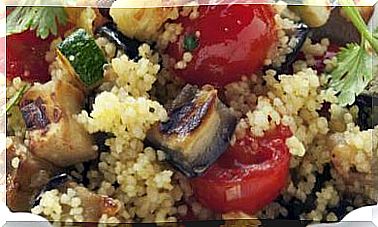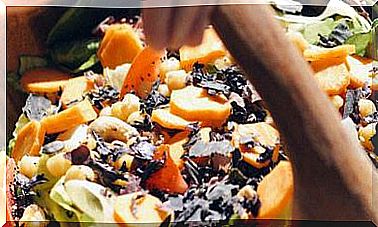Win The Battle Against Emotional Hunger
It is not common to relate to food in a healthy way. Hunger can hide uncomfortable emotions like anxiety or loneliness and we end up overeating.

Whenever we feel hungry, is it due to a physiological need to feed ourselves? Of course not. There is also emotional hunger, that voracious or distracted appetite that prompts us to empty the fridge when what happens to us is that we feel anxious, empty, bored …
Right now we can break old harmful connections and create new, healthier bonds with our bodies and with food. We just need some resources.
Eating behavior is not just eating food : it is the result of a complex relationship of previous family experiences and their evocations; eating routines, cultural values, attitudes and beliefs, the context in which we eat, personal emotions, needs … That is, we eat for many reasons, and rarely is it because we feel hungry.
Throughout our lives, the brain registers all this information, building connections and generating automatisms. All these factors can create a dysfunctional link with food that it is advisable to break as soon as possible.
How to learn to eat well
If we want to eat well, we must train our brain to choose the right options and that requires perseverance and time. It also involves understanding how important is what we eat, how and when we do it.
Having a greater self-knowledge of the psychological, emotional and behavioral processes that affect the way we eat will help us to implement and cultivate healthier eating habits. Where to start?
The first thing to do is to banish the idea of eating as a fight, a battle, to see who can: if the food and the kilos, or us. We must foster a more loving relationship with food, which, in time, will end up being with ourselves. Stop punishing ourselves, judging ourselves … Miracle diets and restrictive behaviors only undermine us psychologically and metabolically. We must stop beating ourselves up with deprivation at once.
The idea is to change the focus from aesthetics to health, to feel good, to find a varied, healthy and rich diet. With changes in customs and the context aimed at a permanent modification of the way we eat, we will favor the care we deserve.
We cannot reflect outside what we do not reflect inside. Beauty goes beyond physical appearance. Beauty is power, congruence, integrity, personality, good sense …
If you choose to lose weight, let it be because you love each other, not because it is what is on the calendar and it is supposed to be done for social accommodation. If the choice to lose weight is made from reconciliation with ourselves, out of desire to take care of ourselves and feel healthy, because of the fact of recognizing ourselves as valuable, it is more likely that we will achieve our goals.
Lose weight with psychology
We must take into account what we eat, how we do it and how we feel when doing it. Our mood, concerns or what we think also accompany us at the table, influencing our appetite and the quantity and quality of what we eat.
If we want to be successful in losing weight and maintaining it over time, it is essential to know and manage the cognitive and emotional processes that are influencing our eating habits in order to effectively modify them.
Many of the problems with excess weight are due to the fact that we eat without hunger, and, therefore, an important point to keep in mind is to relearn to read the signals that our body sends us. That is, eat only when we are hungry and stop eating when we are full, eat consciously.
How to stop confusing hunger and anxiety
Do not confuse hunger with anxiety, relief, boredom, fear, frustration … Learn to discern hunger from snacking.
Neuroscience has discovered that food stimulates the same pleasure centers as with some drugs. Without being aware, many times we use food to calm or mask our emotions and thus be able to satisfy our “emotional hunger”. Food thus becomes an easy and accessible refuge.
But how can we distinguish emotional hunger from physical hunger? Hunger is the physical need to feed while appetite is the desire, even craving, for food. Being hungry is a vital physiological need, essential to properly nourish our body.
Hunger vs. appetite
In general, pure hunger only occurs in extreme circumstances of lack of food. Appetite, however, is influenced by context.
Factors such as smells, flavors, the appearance and presentation of food or certain eating habits intervene that predispose and / or trigger us towards ingestion. Appetite is a gratifying desire, it has a great emotional component.
The “emotional hunger” is superimposed on the “physical hunger” to the point of losing the ability to perceive the real signals of hunger, satiety, satisfaction, etc … The objective should focus on changing the link that exists with food and investigate the causes of this “presumed” emotional eating to identify them and learn to control them. So do not succumb to the ingestion due to emotional emptiness.
Masked needs
The state of mind influences all areas of our life, in the way we eat as well. To discern what emptiness we want to fill with food, what underlying emotions, it can help us to ask ourselves the following questions:
Before eating
- Why am I going to eat?
- From hunger, anxiety, boredom?
- Have I had a dislike and don’t want to think about it now?
- Am I lonely or lonely and I don’t know what to do?
- What have I been thinking and feeling before eating?
During the meal
- How am I eating?
- I enjoy it?
- Do I take my time, or do I do it hastily and impulsively?
- What do I think and feel while eating?
After lunch
- Is there conformity, satisfaction, disgust, or nervousness?
- Do I blame myself, do I judge myself?
- What do I think and feel after eating?
- What messages do you give me?
Sometimes behind the need to eat there is a need for affection, comfort, companionship … If we understand what this “ emotional hunger “ demands of us, it will be easier for us to solve it and solve it instead of masking it. Food should not become a mechanism to regulate our emotions, neither as a reward nor as a compensation.
Techniques that help you
The mindfulness and meditation can be good allies to investigate our answers, to learn to feel full and calm with the present moment. And I don’t want to fail to mention the power of visualization and imagination in weight management. Already the Spanish Nobel Prize winner Santiago Ramón y Cajal supported the importance of mental practice to improve motor capacity.
In psychotherapy imagination and visualization to treat problems like stress, anxiety or phobias is used.
The use of visualization and imagination, as an accompaniment to everything we have discussed so far, can help us in the formation of new connections in the brain, and break the passivity to get going and change.
- So, on the one hand, imagining and visualizing healthy food such as salads, vegetables, fruit or legumes, will make us want to eat and enjoy them more.
- On the other hand, visualizing ourselves achieving our achievements, specifically, losing weight, will propel us towards our goals. The same will happen with how we feel and what we are capable of doing with those extra pounds.
- And also the resource of imagining how we can become and feel will bring us closer to realizing it. I believe so much in myself, so much I can do it.
Get loose for love (yourself)
Losing weight must be tackled from our desire to be healthy. To take good care of ourselves and do it gradually and safely. It is a slow and steady process that can be done without suffering, anxiety and calmly. If done consistently, firmly and steadily, with consistent and manageable goals, there is a good chance of success.
Educating ourselves in a new relationship with food in a balanced way will determine that we gain concentration, mental clarity and desire to do things. It will involve feeding ourselves consciously, without masking our emotions and not as an emotional refuge.
And let’s not forget that food needs are sometimes difficult to handle without professional help.
We must not rule out resorting to a good nutritionist and / or psychologist to support and accompany us. We can even consider the possibility of going to mutual support groups, with other people who want to lose weight as well but who above all feel the desire to learn to love their body and give themselves the permission to live a full life, freeing themselves of the weight that depends on. of the objective of losing weight, as a condition to feel truly full and happy.
Learning new habits and strategies to express all the emotions and our dissatisfactions. Discovering new sources of pleasure, happiness and relaxation.
Daring to look together, at last, at the root issue. Discovering that the issue of weight can be a good gateway to learn to live more at peace with our bodies and with food.









